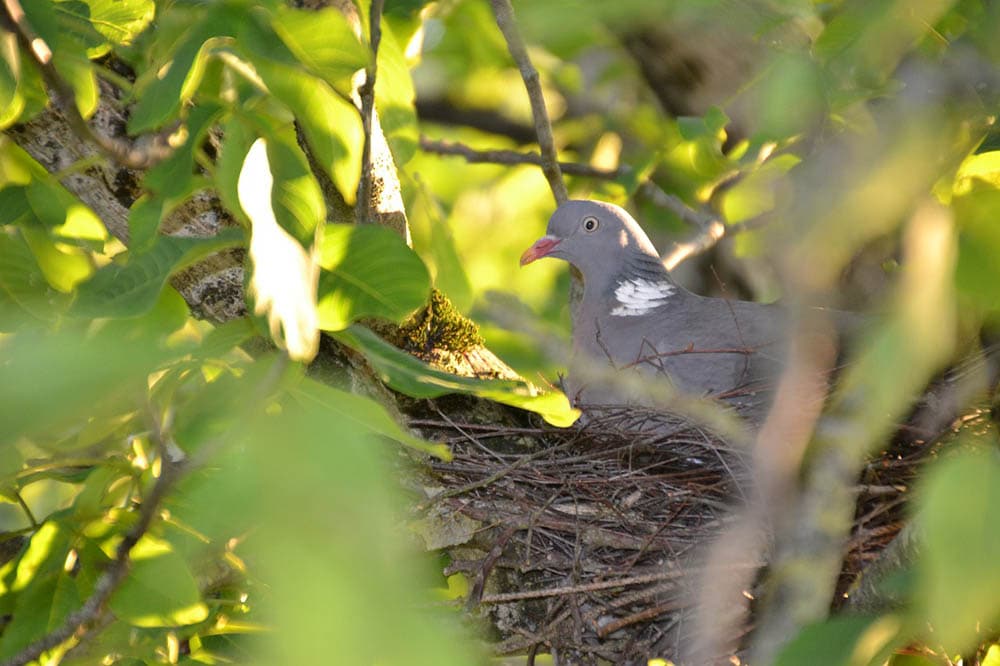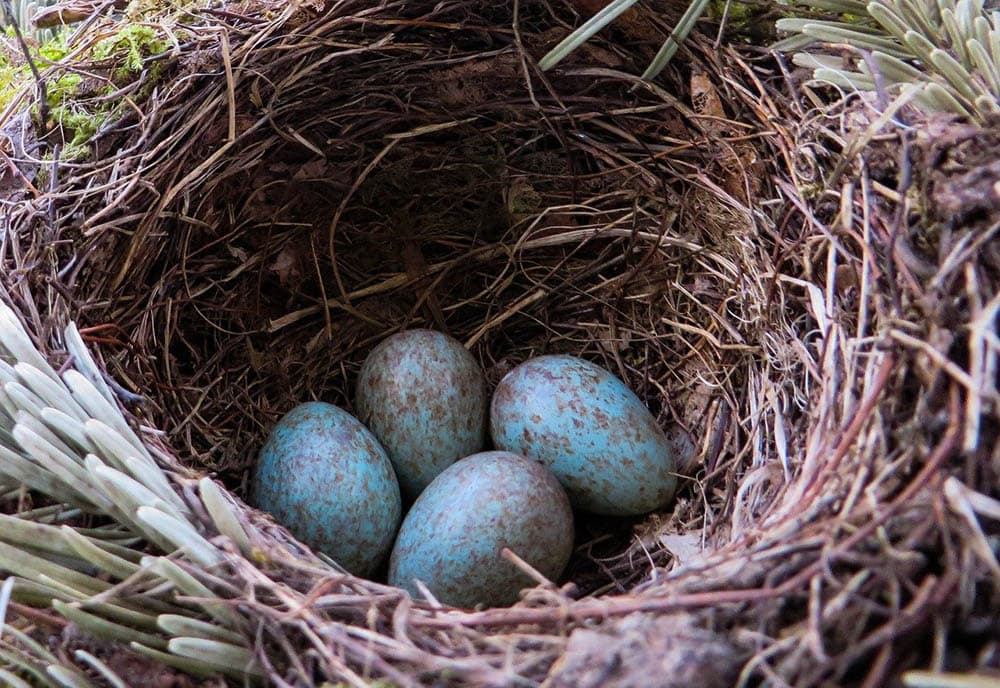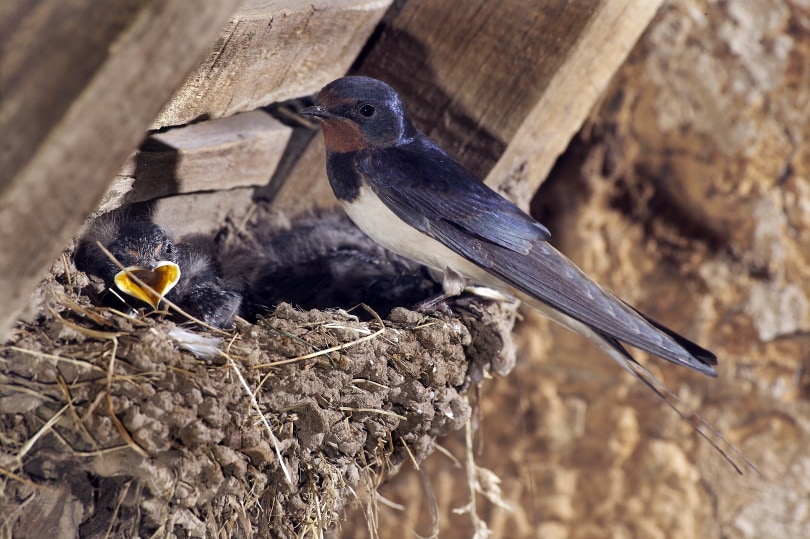How Long Do Birds Stay in the Nest? When Do Chicks Leave?
Last Updated on

Birds lay their eggs in nests that they make. Then, they incubate the eggs by sitting on them and keeping them warm all day and night. Without incubation, the chicks cannot grow inside the eggs, and the eggs will become unviable. After the babies hatch from their eggs, they will stay in the nest for a period of time until they are ready to fly, find their own food, and defend themselves.
How long do eggs incubate in the nest, and how long do chicks stay in the nest once they hatch from their eggs? Find the answers to these questions and more here.

How Long Do Eggs Incubate in the Nest?
The amount of time that a bird’s eggs will incubate in a nest varies from species to species, so there is no one specific timeline. However, there are a few estimates that we can look at. For example, small birds, like songbirds, typically incubate in their nests for about 2 weeks, give or take a day or two. Here are other examples:
- Large Birds — Woodpeckers and similar sized/types of birds will incubate in their nests for anywhere between 3 weeks and 1 month.
- Ducks and Gamebirds — It takes between 2 and 3 weeks for these birds to incubate long enough to hatch.
- Chickens — These birds take about 21 days to hatch.
In general, eggs incubate for at least 10 days and no more than 30 days before they hatch. The hard part is keeping the eggs safe so the babies inside have enough time to develop and hatch properly.

How Long Do Chicks Stay in the Nest?
The amount of time that a chick stays in the nest before heading off on its own depends on the type of bird in question. Ducks leave the nest immediately after they hatch, as they can walk, see, and get their own food practically from the get-go. It takes a couple of days for chickens to leave the nest, as they must first figure out their surroundings and how to maneuver their bodies.
Most songbirds are ready to leave the nest within 3 weeks after hatching. Raptors tend to stay in the nest for up to 10 weeks. Precocial birds (those that can move and see right away) usually leave the nest within hours to look for their own food. Altricial birds cannot move and see on their own right away, which is why they must stay in their nest for a while before leaving to fend for themselves.
The time in which a baby altricial bird must stay in the nest and rely on their parents for food, comfort, warmth, and protection is extremely dangerous. These birds have no eyesight, no feathers, and no way to understand what is going on around them. They can’t fly, and they certainly cannot determine when a predator is nearby. They also tend to make a great deal of noise when crying out for their parents to bring them food. Therefore, they make easy targets for predators. Parents must always stay on high alert, night and day.

How Do Parent Birds Build Nests?
All birds use materials that they find in the wild to build their nests. They might build their nests in trees, on the eaves of homes, and on tall objects in public parks, to name just a few places. Some birds collect twigs and grass, then weave the materials together to create a sturdy nest base. Other birds utilize mud, gravel, leaves, and even discarded pieces of paper that they find laying around to create their nests.
Birds that dwell in cold climates tend to line their nests with blades of grass and fallen leaves for extra insulation that helps keep eggs warm at night. Birds that live primarily in warm climates may place small rocks in the bottoms of their nests to create extra airflow that will keep themselves cool while incubating eggs.
Related Read: 13 Birds That Lay Their Nests On The Ground (With Pictures)

Conclusion
Whenever you see a bird nest in your yard, keep an eye on it. With patience and care, you should be able to watch birds incubate their eggs and experience the sights and sounds of the babies while they wait to be ready for independence. Baby birds are adorable, but they should never be touched or taken out of their nests. Leaving them in their nests with their parents affords them the best chance of survival.
Featured Image Credit: Innviertlerin, Pixabay
About the Author Rachael Gerkensmeyer
Since 2000, Rachael has been a freelance writer, and has had an opportunity to research and write about many different topics while working to master the art of fusing high-quality content with effective content marketing strategies. She is an artist at heart and loves to read, paint, and make jewelry in her spare time. Rachael is obsessed with helping animals in need both in her community and anywhere in the world where she feels she can make a difference. She lives off the grid in Hawaii with her husband, her garden, and her rescue animals including 5 dogs, a cat, a goat, and dozens of chickens, so it's no surprise that animals happen to be her favorite topic to write about!
Related Articles:
10 Types of Hummingbirds in Arkansas (With Pictures)
8 Types of Hummingbirds in Nebraska (With Pictures)
5 Types of Hummingbirds in Idaho (With Pictures)
3 Types of Hummingbirds in Mississippi (With Pictures)
8 Types of Hummingbirds in Kansas (With Pictures)
5 Types of Hummingbirds in West Virginia (With Pictures)
5 Types of Hummingbirds in Ohio (With Pictures)
Where Do Nuthatches Nest? Nuthatch Nesting Habits Explained
